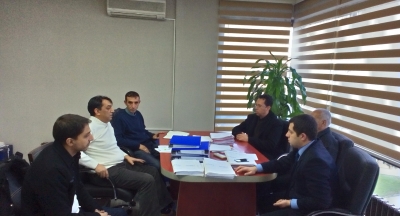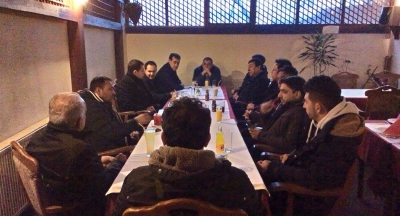Gostivar
"The former Yugoslav Republic of Macedonia" Country Findings of the external evaluation by Blomeyer and Sanz s.l. available in Macedonian and English.
*Disclaimer: The information and views set out in this page are those of the author and do not necessarily reflect the official opinion of the Council of Europe and/or the European Commission. Neither the Council of Europe, the European Commission nor any person acting on their behalf may be held responsible for the use which may be made of the information contained therein.
Gostivar is one of the largest municipalities in “the former Yugoslav Republic of Macedonia”, with around 81,042 inhabitants of diverse ethnicities, out of whom 2,237 are Roma. After the ethnic conflict in 2001, the Ohrid Framework Agreement gave rights to all ethnicities living in “the former Yugoslav Republic of Macedonia” and, implicitly, in Gostivar, where Roma were also included. Within the Framework are regulated the following points: Basic principles, Cessation of Hostilities, Development of Decentralized Government, Non-discrimination and equitable representation, Special Parliamentary Procedures, Education and use of languages, Expression of Identity.
A proportion of the Roma in Gostivar constitutes an extremely marginalized population: 80 % are unemployed and depend on social welfare. About one third live in sub-standard conditions in illegal housing.
Roma in Gostivar live in several neighborhoods: Dupka, Banjeshnica, Makedonsko Maalo, Fazanerija, Grudajci and Ciglana. In all of the settlements they are facing issues as in the other municipalities. In all of these settlements there are infrastructural problems with sewage and water supply, lighting, and not asphalted streets. Given the infrastructural problems in these communities, these settlements are coping through the implementation of the Detailed Urban Plan, the General Urban Plan and Housing. The Roma community in these settlements lives in very bad conditions.
Unemployment is a general problem in Macedonia where 32% of the whole population finds itself in this situation. This issue also affect Roma in Gostivar, many of them being unemployed, or working in informal sectors. A good example in this municipality is provided however by the Roma employed in local institutions. There is also one Municipal Councilor of Roma origins and one referent for minority issues in the municipality.
In Gostivar there is one active Roma NGO named “Mesecina”. Employees and members of the organization are also members of the Community Action Group.
Within the municipality of Gostivar, only one municipal councillor is Roma. Nevertheless, Roma from Gostivar have reached top-level positions at national level, such as ministers, vice-ministers or Members of Parliament. In this municipality there are Roma employees in almost all institutions at local level. There is a Roma social worker, judge, doctor, employee in the registration office, etc.
The Community Action Group in Gostivar is made up of 7 core members, and up to 12 people participating at various moments. The members are all adult men, however the group is aware of the need to include young persons and women and they are taking measures to attract such profiles in the group. The members of the CAG have diverse backgrounds, with persons having experience in the NGO sector, or within the local administration or other local institutions. All the members live in the Roma neighborhoods of Gostivar and share the same problems as the majority of the Roma in the city.
The Community Action Group in Gostivar has defined short term priorities:
- * Infrastructural issues: asphalting and installation of sewage and water supply and in all settlements where Roma live;
- * Encouraging for Registration of Roma students in medical school and university; with aim to be increased the number of Roma medical students because of deficiency in that area. This will be stimulated with scholarships by REF and RMUSP program.
- * Official recognition, formalization of the CAG by the local authorities. CAG from Gostivar has an initiative to be formalized and to function as a part of the Municipality.
The long term priorities of the Community Action Group concerns mainly:
- * Legalization of houses from Fazanerija neighborhood;
- * Solving the Detailed Urban Plan and the General Urban Plan in the neighborhoods where Roma live.
The Municipality of Gostivar has applied to IPA funds with an employment project for Roma, together with the local NGO "Mesecina", however the carrier of the project is the Municipality.
There is still a priority for infrastructure, and the Municipality is prepared to apply for various funds for it.
The municipality of Gostivar has prepared a development programme with projects for 2014 (which are still not implemented, because of procedures and finances). In this development programme the following settlements are included: Fazanerija, Grudajci and Ciglana as settlements with a majority of Roma population, for which are allocated 50,614,500 Euros. This program was approved by the Municipal Council.
A Roma preschool teacher has been employed in the kindergarten of Debreste with support of UNICEF. The school plans to hire an additional Roma preschool teacher. Moreover, the municipality of Gostivar supports projects on tutoring and the inclusion of Roma in pre-school education.
The Municipality of Gostivar supports the project “Step forward for better education of Roma in primary education”.
The Municipality of Gostivar has launched an initiative in the settlement Ciglana for the building of social housing for social beneficiaries, in which Roma and other nationalities will live as well as social beneficiaries. The Municipality has sent a request for financing to the Ministry of Transport and Connection. The project is to be financed through IPA Funds, as well as with the financial investment of the Municipality.


